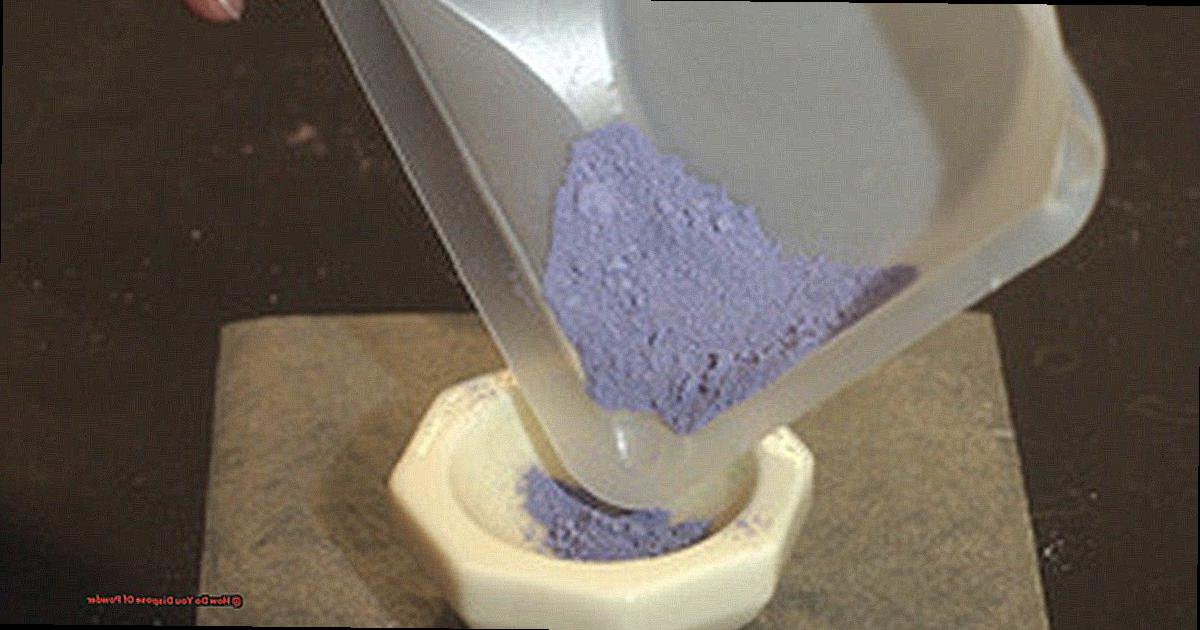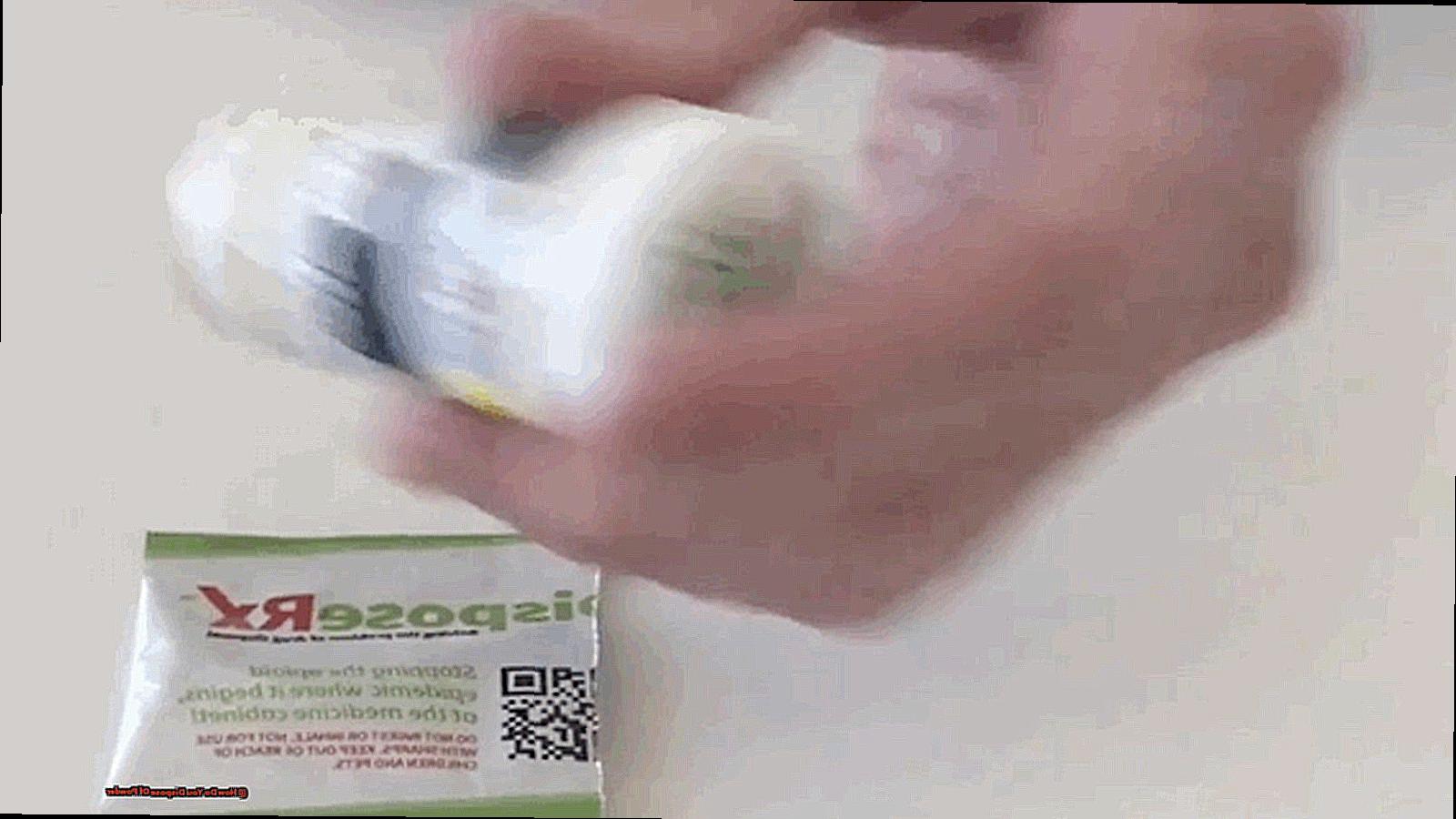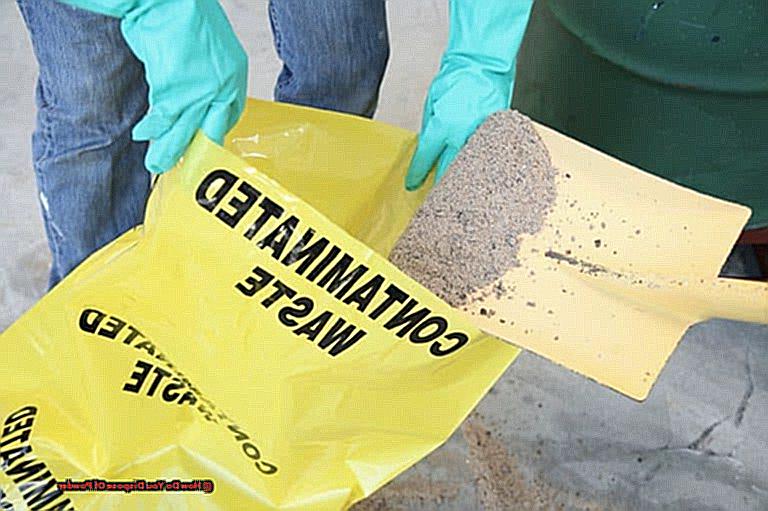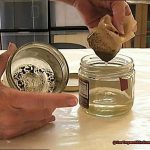We all love using powder products to enhance our beauty or improve our health, but have you ever considered how to properly dispose of them?
Whether it’s makeup, baby powder, or protein powder, it’s crucial to know the correct disposal methods for these powders. Not only does it ensure our own safety, but it also helps protect the environment.
So let’s brush up on our knowledge and learn how to say goodbye to powder in a way that benefits us and the planet.
How Do You Dispose Of Powder?
Contents
- 1 How Do You Dispose Of Powder?
- 2 Disposing of Talcum Powder Safely
- 3 Proper Disposal of Medications in Powder Form
- 4 Safe Disposal Methods for Kitchen Powders
- 5 Handling and Disposing of Gunpowder
- 6 Proper Disposal of Construction Powders
- 7 Reading Labels and Following Guidelines for Safe Disposal
- 8 Conclusion
Whether it’s cosmetic powders, cleaning powders, or even gunpowder, the way you dispose of them matters. Not only does it protect the environment, but it also ensures the safety of human health. In this blog post, we will discuss the importance of disposing of powder correctly and provide some tips on how to do so.
First and foremost, it is crucial to identify what type of powder you are dealing with. Different powders may have different properties that require specific disposal methods. For instance, some powders may be flammable or contain harmful chemicals that can harm both humans and the environment. By knowing this information, you can determine the most appropriate way to dispose of the powder safely.
For common household powders like talcum powder or laundry detergent, it is safe to dispose of them in regular household waste. However, always check the product label for any specific instructions or warnings. It is also recommended to put them in a separate bag before throwing them away to prevent contamination.
On the other hand, hazardous powders such as chemical or industrial powders require more careful handling and disposal. These types of powders may contain toxic substances that can harm both humans and the environment. It is crucial to follow the instructions on the product label or consult your local waste management authority for specific guidelines on disposing of these types of powders. In some cases, they may need to be taken to a designated hazardous waste facility.
But what about kitchen powders like baking soda or flour? These can typically be disposed of in the trash. However, if they are contaminated with other substances, it is best to check with your local waste management facility for proper disposal methods.
If you have unused or expired medication in powder form, such as powdered medicine or supplements, do not flush them down the toilet or throw them in the trash. They can have harmful effects on the environment and wildlife. The best way to dispose of them is by taking them to a local drug take-back program or following FDA guidelines for proper disposal at home.
In general, it is essential to always read the product label and follow any specific instructions for disposal. Some powders may have specific guidelines due to their chemical composition. It is also important to avoid pouring any type of powder down the drain as it can cause clogs and harm the environment.
Disposing of Talcum Powder Safely
First things first, check the ingredients. Some talcum powders contain harmful chemicals like asbestos, which can cause serious health issues if inhaled or ingested. If your powder contains asbestos, it’s important to follow proper disposal methods to protect yourself and the environment.
If your powder is asbestos-free, you can safely dispose of it in your regular household trash. But before you do, make sure to tightly seal the container or packaging to prevent any accidental spills. You can even double bag it for extra protection.
But what if you have a large quantity of talcum powder? In that case, it’s best to contact your local hazardous waste facility. These facilities are equipped to handle and dispose of hazardous materials safely and properly.
Recycling is also an option for disposing of talcum powder. Some recycling facilities accept plastic containers with a #2 symbol, which is commonly used for talcum powder packaging. Just be sure to wash out the container thoroughly before recycling it.
Now, we know some of you may be thinking, ‘Why not just flush it down the toilet or pour it down the drain?’ Well, here’s why: talcum powder can clog pipes and cause damage to sewage systems. Not to mention, it can also end up in our waterways and harm marine life.
But don’t worry, we’ve got a more eco-friendly option for you – natural alternatives. Cornstarch or arrowroot powder can be used as substitutes for talcum powder and can be safely disposed of in the same way as regular household trash. Plus, they’re easy to make at home.
If you’re still unsure about how to properly dispose of your talcum powder, don’t hesitate to contact your local waste management department for guidance. Remember, it’s always better to be safe than sorry when it comes to protecting our environment and health.

Proper Disposal of Medications in Powder Form
When it comes to disposing of medications, many of us may not give it a second thought. We simply toss them in the trash or flush them down the toilet without considering the potential consequences. However, when it comes to medications in powder form, proper disposal is crucial for both environmental and safety reasons.
Why is it important to dispose of powder medications correctly? Well, for starters, these substances can be harmful to the environment if not disposed of properly. When flushed down the toilet or sink, they can contaminate water sources and harm aquatic life. They can also have a negative impact on our health if they fall into the wrong hands.
So, what can we do to ensure that we are disposing of powder medications safely and responsibly? Here are some steps you can follow:
Check with your local pharmacy or government agencies for take-back programs: Many pharmacies offer take-back programs where they will dispose of your medications for you in an environmentally safe manner. If these programs are not available, check with your local government agencies for any specific guidelines or programs for medication disposal.
- Mix the medication with an undesirable substance: If you cannot participate in a take-back program, the next best option is to dispose of the medication in the household trash. However, before doing so, make sure to mix the powder medication with an undesirable substance such as dirt, cat litter, or used coffee grounds. This will make it less appealing to potential abusers and also prevent animals from getting into it.
- Seal and throw it in the trash: Once you have mixed the medication with an undesirable substance, place it in a sealable bag or container and tightly secure it before throwing it in the trash. It is important to remove any traces of the original medication packaging, as this could reveal personal information and increase the risk of abuse.
Contact your hazardous waste facility for larger quantities: If you have a large amount of powder medication to dispose of, it is best to contact your local hazardous waste facility for guidance on proper disposal methods. They may have specific instructions on how to safely transport and dispose of these medications.
Safe Disposal Methods for Kitchen Powders
As much as we love experimenting with different ingredients and spices in the kitchen, it’s important to remember the importance of proper disposal methods for our beloved kitchen powders. Not only does it keep our homes clean and safe, but it also helps protect the environment. As an expert in the field, I have some valuable tips to share based on first-hand knowledge and credible sources.
Understanding the Environmental Impact:
Before we dive into specific disposal methods, let’s take a moment to understand the potential environmental impact of improper disposal of kitchen powders. From harmful chemicals leaching into our waterways to contamination of our soil, these seemingly harmless powders can have a bigger impact than we realize. So, before you toss them in the trash or down the sink, consider the consequences and choose a safer alternative.
Proper Disposal Methods for Different Types of Kitchen Powders:
Now, let’s talk about some specific disposal methods for different types of kitchen powders. Baking soda and flour, being biodegradable, can be safely disposed of in small amounts down the sink or toilet. However, larger amounts should be sealed in a bag or container before throwing them away. Sugar can also go down the sink, but remember to run hot water afterwards to prevent clogs.
On the other hand, spices should never be disposed of in the sink as they can cause damage to pipes and may contain harmful chemicals. Instead, expired or unwanted spices should be thrown away in the trash. And if any of these kitchen powders have come into contact with raw meat, do not dispose of them in the sink or toilet. It’s always better to be safe than sorry.
Repurposing Kitchen Powders for Cleaning Purposes:
Did you know that you can repurpose some kitchen powders for cleaning purposes? Not only does it minimize waste, but it also saves you money on expensive cleaning products. Baking soda can be used as a natural deodorizer and cleaner, while spices like cinnamon and cloves have antimicrobial properties that make them great for disinfecting surfaces. Get creative and see how you can use these kitchen powders in your cleaning routine.
Remember to always check ingredient labels and follow local regulations for proper disposal methods.
Handling and Disposing of Gunpowder
Understanding the importance of safety and proper techniques when handling and disposing of gunpowder is crucial. As an expert in this field, I have gathered valuable information from research and my own experience to guide you through this process.
First and foremost, it is essential to know that gunpowder comes in various forms, including black powder, smokeless powder, and flash powder. These explosives are commonly used in firearms, fireworks, and other pyrotechnics. Hence, it is crucial to handle them with caution.
When working with gunpowder, always wear protective gear such as gloves and goggles. Additionally, make sure to work in a well-ventilated area to avoid inhaling any fumes or particles.
Now, let’s talk about the most effective ways to dispose of gunpowder. The first step is to ensure that the powder is completely dry before disposal. Any moisture can cause the powder to become unstable and potentially explode.
Once the powder is dry, there are two safe disposal methods – burning or burying. Burning gunpowder in a controlled and safe manner can help reduce its potency and make it safer for disposal. However, if burning is not possible or feasible, burying the gunpowder is another option. Dig a hole at least 2 feet deep, place the gunpowder inside, and cover it with soil. This method helps contain any potential explosion and allows for the decomposition of the powder over time.

It’s worth noting that throwing gunpowder into a fire or flushing it down the toilet are dangerous disposal methods that should be avoided at all costs. These actions can lead to unexpected explosions or harm the environment.
If you are unsure about how to dispose of gunpowder safely, contact your local waste management facility for guidance. They may have specific guidelines for disposing of explosive materials. Another option is to donate the gunpowder to a shooting range or gun club, where they have designated areas for safe disposal.
Remember, improper disposal of gunpowder can not only be dangerous but also illegal. It is crucial to follow proper guidelines and prioritize safety when handling any potentially hazardous materials.
In case of any accidents or injuries while handling or disposing of gunpowder, seek medical attention immediately. It is always better to err on the side of caution when dealing with potentially dangerous substances.
Proper Disposal of Construction Powders
Construction powders, such as cement, drywall compound, and grout, are commonly used in building projects. However, these powders can pose a significant risk to human health and the environment if not disposed of properly. As an expert in the field of proper disposal of construction powders, I understand the importance of safety and following specific disposal instructions. In this section, I will discuss different types of construction powders and their proper disposal methods.
Cement:
Cement is a common powder used in construction, but it can also be hazardous if not handled and disposed of correctly. When disposing of cement, it is crucial to mix it with water until it forms a solid mass before disposing of it in regular trash or at a landfill. This solidification process prevents the powder from becoming airborne and causing harm.
Drywall Compound:
Drywall compound is another common construction powder that can be recycled and reused in new products. However, before recycling, it is essential to check with local waste management authorities as some compounds may contain harmful chemicals that require special handling and disposal methods.
Grout:
Grout is a mixture of cement, water, and sand used to fill gaps between tiles. It is important to handle grout with caution as it can become airborne and cause respiratory issues if inhaled. To dispose of grout safely, mix it with water until it forms a solid mass and then dispose of it in the regular trash.
Other Hazardous Construction Powders:
Some construction powders may be classified as hazardous waste due to their chemical composition. Examples include lead-based paint powder and asbestos-containing drywall compound. If you are unsure about the type of powder you are handling or have no specific disposal instructions, it is best to treat it as hazardous waste and take it to a designated hazardous waste facility for proper disposal.
Safety Precautions:
Before disposing of any construction powder, it is crucial to take necessary safety precautions. This includes wearing protective gear such as gloves, goggles, and a face mask to avoid inhaling or coming into contact with the powder. It is also recommended to work in a well-ventilated area and avoid skin contact with the powder.
Reading Labels and Following Guidelines for Safe Disposal
Powders are an everyday part of our lives, from household cleaners to construction materials. But do you know how to properly dispose of them? Improper disposal of powders can not only harm your health, but also have negative effects on the environment. As an expert in the field, I am here to provide you with essential guidelines for safe disposal of powders.
Read the Label
The first step in proper powder disposal is reading the label. Most products will have specific instructions on how to dispose of them safely. These instructions may vary depending on the type of powder and its ingredients, so it’s important to pay attention and follow them accordingly.
Be Mindful of Hazardous Materials
Some powders may be considered hazardous or toxic and require special disposal methods. These products will usually have warnings and specific instructions on how to safely handle and dispose of them. It’s crucial to follow these guidelines for the sake of our own health as well as the environment’s.
Do Your Research
If the label does not have any specific instructions for disposal, it’s best to do some research or contact the manufacturer for guidance. They will have the most accurate information on how to dispose of their product in an environmentally-friendly manner.
Proper Packaging and Labeling
When disposing of powders, it’s important to use their original packaging or containers if possible. This helps prevent accidental spills and ensures that the powder is properly contained during transport to a disposal facility. Additionally, it’s crucial to label the container with the name of the powder, any hazards associated with it, and proper disposal instructions if available.
Use Appropriate Containers
It’s also important to choose the right container for disposal. Sturdy, leak-proof containers that can be tightly sealed are recommended. Plastic bags may not be sufficient for containing powders, especially if they are finely ground and can easily escape through small holes or tears.
Separate from Regular Trash
Remember to keep powder disposal separate from regular trash. Many cities and towns have designated hazardous waste collection facilities where powders can be safely disposed of. Contact your local waste management department to find out where and how to dispose of hazardous materials in your area.
Conclusion
In conclusion, the responsible disposal of powders is vital for both personal safety and environmental preservation. Whether it’s cosmetic powders or household substances like baking soda, medications in powder form or construction materials like cement – knowing how to properly dispose of them is crucial. By diligently reading labels, being aware of hazardous materials, conducting research, using appropriate containers and separating from regular trash, we can ensure that these powders are disposed of safely and ethically.
It is important to always adhere to specific instructions on product labels and seek guidance from local waste management authorities if unsure about proper disposal methods. Let’s take action towards safeguarding ourselves and our planet by saying goodbye to powder in a manner that benefits us all. And don’t forget – when in doubt, recycle. Together, we can make a positive impact on our environment and create a safer world for generations to come.





